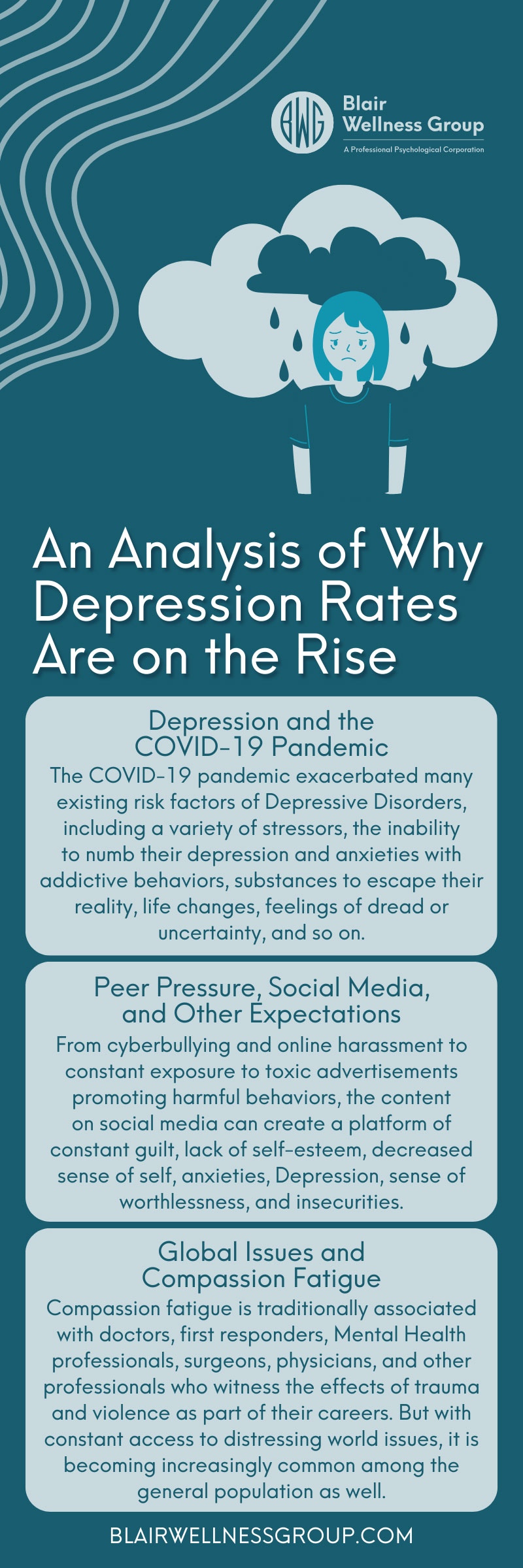Depressive Disorders are among the most common Mental Health Conditions in the United States, and they have only grown more prevalent in the recent years. Determining the societal factors that contribute to a statistical increase in Depressive Disorder diagnoses allows Licensed Clinical Psychologists to identify cases of Depression and tailor their treatment approaches to client needs, background, history, current circumstances, and future goals. This information also makes it easier for individuals to recognize the signs and symptoms of Depressive Disorders in themselves or their loved ones. In turn, this knowledge helps an individual to gain awareness and understand the benefits of seeking the professional treatment they deserve as soon as possible.
Explore the contributing factors to the recent increase in Depressive Disorders in modern society using this analysis of why Depression rates are on the rise.
Depression and the COVID-19 Pandemic
The COVID-19 pandemic brought many challenges; an increase in Depressive Disorders is just one example of the way it worsened Mental Health Disorder rates across the United States. The COVID-19 pandemic exacerbated many existing risk factors of Depressive Disorders, including a variety of stressors, the inability to numb their depression and anxieties with addictive behaviors, substances to escape their reality, life changes, feelings of dread or uncertainty, and so on. The rise of comorbid disorders such as Anxiety Disorders, reliance on substance abuse, and PTSD in the midst of the pandemic created stress, exacerbated Depression symptoms, and increased the likelihood of developing Depressive Disorders. At the same time, high morbidity rates of COVID-19 led countless individuals to experience grief, loss, and worsening of their Mood Disorders and addictive behaviors.
Depressive Disorders skyrocketed among youth and adolescents as well as adults, as the pandemic disrupted daily routines and forced people to rip off the bandage from numbing and concealing the underlying Depression, Anxiety, Personality Disorders, Traumas, and Addiction Issues. For adults, remote work situations forced people to sit with their anxieties, depression, emptiness, inner void, and uncomfortable feelings instead of using other people and bodies at work to numb and distract themselves from being accountable to their own lives and focus on creating a fulfilling future for themselves. Without widespread interference and mental health treatment, these factors will continue to contribute to rising rates of Depression, Anxieties, Traumas, Addictions, suicidality, and other adverse conditions following the pandemic.
Peer Pressure, Social Media, and Other Expectations
Peer pressure has always been an issue that generates and spreads feelings of harsh comparison, unworthiness, and self-loathing among social groups. However, these factors have worsened significantly in recent years due to the increasingly powerful presence of social media.
From cyberbullying and online harassment to constant exposure to toxic advertisements promoting harmful behaviors, the content on social media can create a platform of constant guilt, lack of self-esteem, decreased sense of self, anxieties, Depression, sense of worthlessness, and insecurities. Because of its universal nature, peer pressure from social media affects more than just young adults. The constant pressure and self-doubt that stems from social media sparks Depressive Disorders—and other Mental Health Conditions like Addiction Disorders and Anxiety Disorders—among individuals of every background, age, socioeconomic status, gender, ethnicity, and educational achievement.
Global Issues and Compassion Fatigue
Social media has also increased rates of compassion fatigue, which is another risk factor for Depressive Disorders. Compassion fatigue refers to the stress and trauma that can stem from the exposure you face when you empathize with and help others in dire situations.
Compassion fatigue is traditionally associated with doctors, first responders, Mental Health professionals, surgeons, physicians, and other professionals who witness the effects of trauma and violence as part of their careers. But with constant access to distressing world issues, it is becoming increasingly common among the general population as well.
Social media gives people of all ages easy access to information about world issues—and not just from certified news sources. Uncensored photos, unfiltered videos, and unedited descriptions of traumatic experiences such as violence and destruction circulate across the internet and become casual viewing for anyone scrolling through their social media platforms and feeds. This accessibility creates an overwhelming amount of mentally draining and distressing information for people to face on a daily basis, which contributes to adverse Mental Health conditions and worsening of depression, anxieties, addictive behaviors, and low self-esteem.
Insecure Access to Essential Needs
Not having consistent access to essential needs such as adequate mental health resources and premium healthcare could be another common factor behind why Depression rates are on the rise in our modern society. Such factors have made it progressively difficult for people—especially younger adults—to seek proper professional treatment from qualified and skilled Licensed Clinical Psychologists, who possess the proper bandwidth and knowledge base required to intently provide them with necessary mental health interventions.
This lack of access creates major stressors and exacerbates feelings of fear, dread, worry, and hopelessness. Some individuals who do not have dependable access to qualified and premium mental health services are also far less likely to seek mental health treatment because they cannot afford it. Meanwhile, others may not see a point in pursuing treatment due to complete lack of awareness, ignorance, or the acuity and severity of their Mental Health Disorders and Addictions.
An Epidemic of Addiction and Numbing Behaviors
Addictions increase the likelihood of increased Depression and other Mental Health Conditions. Additionally, in the age of social media, online gaming, and other prevalent online platforms, many spend significantly more time engaging in such addictive behaviors. COVID-19 played a role in exacerbating this issue, but it was a problem before the pandemic and continues to be a significant factor influencing Depression rates following the pandemic.
Numbing behaviors and using other people as bodies to distract oneself from attending to necessary treatment for their Mood Disorders and Addiction Issues create negative spirals that are difficult to break out of. The less time you spend on seeking proper interventions from professionals, the harder it is to cultivate and maintain or nourish healthy relationships. Without healthy and high-quality relationships, loneliness increases, social skills deteriorate, and the cycle of worsening depression, anxieties, and addiction issues continues to exacerbate.
The Rise of Comorbid Disorders
It is important to note that Depressive Disorders are not the only Mental Health Disorders seeing higher rates in recent years. Anxiety Disorders, Eating Disorders, Panic Disorders, trauma/PTSD, Obsessive-Compulsive Disorder, Addictions, and Bipolar Disorders are just a few examples of Mental Health Conditions that have become increasingly common. Many of these Mental Health Disorders are seeing higher rates due to the same factors affecting Depressive Disorder rates.
These Mental Health Disorders are often comorbid with Depressive Disorders, meaning an individual who develops one is likely to develop one or more of the others as well. An increase in a single Mental Health Disorder leads to an increase in its comorbid disorders, contributing to a rise in Depressive Disorders and all their comorbid conditions.
Depressive Disorder Treatment With Blair Wellness Group
Understanding some of the contributing factors to Depressive Disorders is the first step to getting the mental health treatment you deserve. At Blair Wellness Group, our Depression Psychologists specialize in providing specialized treatment plans utilizing evidence-based therapeutic models and scientific approaches to create customized and tailored interventions for all concierge clients suffering from Depressive Disorders and other Mental Health Disorders or Addictions. Improve mental and emotional well-being when you book an appointment with the Blair Wellness Group team of professionals.

Dr. Cassidy Blair is a renowned Licensed Clinical Psychologist and trusted Performance Coach who specializes in providing Concierge-Psychological Care and Executive Coaching for high-achieving professionals. With a deep understanding of the unique challenges faced by CEOs, executives, entrepreneurs, and leaders, Dr. Blair offers tailored, confidential care designed to foster emotional well-being, personal growth, and professional excellence. Her clientele values her discretion, clinical expertise, and emotionally intelligent approach to navigating complex personal and professional dynamics.
- This author does not have any more posts.




